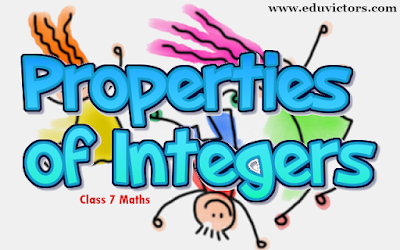Class 7 - Mathematics - Properties of Integers
1. Closure Property Under Addition
Integers are closed under addition, i.e. for any two integers,a and b, a+b is an integer.
eg: 3 + 4 = 7
-9 + 7 = 2
2. Closure Property under Subtraction:
Integers are closed under subtraction, i.e. for any two integers,a and b, a-b is an integer.
eg:
-21 -(-9) = -12
8 -3 = 5
3. Closure Property under Multiplication:
Integers are closed under multiplication, i.e. for any two integers,a and b, ab is an integer.
e.g.
5 × 6 = 30
-3 × -8 = 24
-3 × 7 = -21
4. Closure Property under Division:
Integers are NOT closed under division, i.e. for any two integers, a and b, a/b need not be an integer.
e.g. 2 ÷ 0 = undefined
2 ÷ 3 = 2/3 (a fraction, not an integer)
5. Commutative Property under Addition:
Addition is commutative for integers. For any two integers, a and b, a+b = b+a
e.g.
5 + (-3) = -3 + 5 = 2
(-6) + 5 = -6 + 5 =-1
5 + (-6) = (-6) + 5 = -1
6. Commutative Property under Subtraction:
Subtraction is NOT commutative for integers. For any two integers a and b, a-b ≠ b-a
e.g. 8 - (-6) = 14 and -6 - 8 = -14
7. Commutative Property under Multiplication:
Multiplication is commutative for integers. For any two integers, a and b, a × b = b × a
e.g. 9 × (-6) = (-6) × 9 = -54
8. Commutative Property under Division:
Division is NOT commutative for integers. For any two integers a and b, a/b ≠ b /a
e.g. 3/6=1/2 while 6/3 = 2
9. Associative Property under Addition
Addition is associative for integers. For any three integers, a, b and c, a + (b + c) = (a + b) + c
e.g.
5 + (7 + 3) = 5 + 10 = 15
(5 + 7) + 3 = 12 + 3 = 15
4 + (-6 + 3) = 4 -3 = 1
(4 + (-6)) + 3 = (4 - 6) + 3 = -2 + 3 = 1
10. Associative Property under Subtraction:
Subtraction is NOT associative for integers. For any three integers , a-(b-c) ≠ (a-b)-c
e.g. 5 — (6-4) = 5-2 = 3
(5-6) - 4 =-1-4=-5
11. Associative Property under multiplication:
Multiplication is associative for integers. For any three integers, a, b and c, (a × b) × c = a × (b × c)
e.g. [(-3) × (-2)] × 5 = 6 × 5 = 30
(-3) × [(-2) × 5] = (-3) × (-10) = 30
12. Associative Property under Division:
Division is NOT associative for integers.
13. Distributive property of multiplication over addition:
For any three integers, a, b and c, a × (b + c) = a × b + a × c
e.g. -2 (4 + 3) = -2(7) = -14
-2 (4 + 3) = (-2 × 4) + (-2 × 3) = (-8) + (-6) = -14
14. Identity under Addition:
Integer 0 is the identity under addition. That is, for an integer a, a+0=0+a=a.
e.g. 5 + 0 = 0 + 5 = 5
15. Identity under Multiplication:
The integer 1 is the identity under multiplication. That is, for an integer a, 1 × a = a × 1 = a
e.g. (-5) × 1 = 1 × (-5) =-5
Ch 1 - Introduction to Integers
Ch 1 - Integers (NCERT Ex 1.2)
Ch 1 - Integers (NCERT Ex 1.3)
Ch 1 - Integers (Key Points)
Ch 2 - Decimals - Multiplication and Division (Worksheet)

Very well explained. Thank you
ReplyDelete